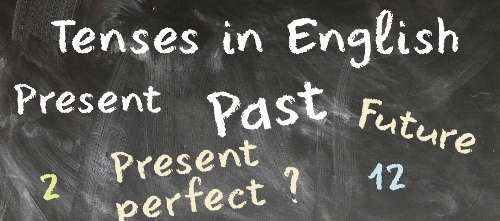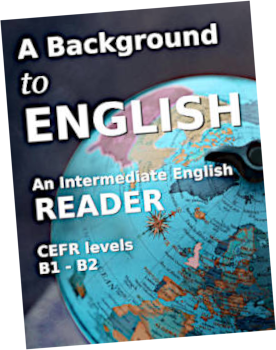
How many tenses does English have?
by Andrew Rossiter
The short answer is: as many as you care to recognise.
The question "How many tenses are there in English?" is one that is a regular source of discussion, not to say heated arguments, among teachers, students and linguists. It would be wonderful if we could therefore give a "definitive", objective, and incontravertible answer to this question, and say "Two", or "Six", or "Twelve"... or even "Fourteen", and know that this was the right answer.Unfortunately we can't. For two reasons there is no "right" answer to this question, and never will be. The reasons are that:
- a) there is no universally accepted definition in English of what a tense actually is, the word means different things to different people; and
- b) linguistics and grammar are not exact sciences so can only provide models, not irrefutable definitions.
Since the middle of the twentieth century, there have been two predominant schools of thought regarding the number of tenses in the English language. On the one hand there is the morphosyntactic view of linguists (by which I mean specialists in the field of linguistics, not translators or language teachers), that there are just two tenses in English, commonly called the present and the past. On the other hand, there is the semantic view that is predominant among those who teach or write in the field of EFL (English as a Foreign Language) that English has between four and twelve tenses - with six being the most popular figure. In short, the differing views pit the theorists on the one hand against the practitioners on the other.
Unfortunately most of the "authority" grammar books avilable at the moment take a morphosyntaxic approach to tenses and state that there are just two tenses in English, while practice grammars and guides for EFL teachers have generally taken the word tense in a much wider semantic sense, a difference that is rearely mentioned let alone explained.
Searching online for a definition of the word tense as a term of grammar will produce a wide array of different answers. The Stanford Encyclopedia in the USA (2014), using the model promoted by Declerck in the 1990s, starts by stating that there are two tenses, the past tense and the non-past tense, but then adds further tenses to the list by talking of relative tenses, such as the present perfect and the past perfect – which begs the question, "Is a relative tense a tense, or not?" Apparently not, if there are only two tenses in English... but apparently yes, since they are called tenses, – which is getting into the realm of smoke and mirrors. As for Greenbaum and Quirk, in their seminal books on English grammar that have had so much influence over generations of students and theorists of English linguistics, they refer to two tenses, the past and the present.
The two-tense model favoured by linguists assumes that the word tense refers only to single-word forms of the verb, (such as I do / I did), and not to other time frames where meaning is expressed with the help of an auxiliary (I have done) or a modal (I will do). Practitioners, notably EFL teachers, use the term tense in a much broader sense.
Thus wherever one looks, it is impossible to find a consensual and clear-cut definition, as to what a tense actually is. Tense means different things to different people, depending on whether the word is used in a morphsyntaxic sense or a semantic sense.
The range of different online definitions of tense can be bewildering, particular for anyone who was imagining that there is such a thing as a definitive definition of the term. Definitions range from the very simple, such as " English tenses are the form the verb takes to show the time of an action" (From Writing Explained, a writer's website), to the obfuscatingly complex, such as "It is proposed that tense/aspect markers refer essentially to modal concerns on the part of the speaker/conceptualizer, and that the temporal (and modal) meanings conveyed by them should be analyzed as instantiations of a common epistemic schema.... " (From the abstract for An account of English tense and aspect in Cognitive Grammar (link), by F Brisard, in Oxford Scholarship online (OUP 2015).
The only conclusion possible has to be that the word tense, applied to English grammar and linguistics, means whatever writers want it to mean so that it corresponds to the way in which they personally define or categorize the relation between verb use and time frames in the English language. It is this semantic variability of the word tense that explains why theoretical linguists on the one hand and language teachers on the other, arrive at different conclusions as to the number of tenses in English.
Bearing in mind that the number of practitioners of grammar (English teachers, translators, writers) vastly exceeds the number of theorists (linguistics teachers and students, researchers), it comes as no surprise that Internet searches on topics relating to grammar and linguistics now provide a far larger volume of answers from English teaching websites, most of which are relatively recent, than from the established reference books that until the start of the 21st century had a virtual monopoly as sources of information about grammar. In other words, in the past twenty years, the balance of information available has changed from printed books that expressed the views of the theorists, to websites that express the views of the practitioners.
So how do the practitioners count tenses in English? As already mentioned, there is no precise consensus here. The number varies from 2 to 12, depending on how or whether "aspect" is taken into account, and how many aspects are recognised, two, three or four. There is on the other hand a general consensus that by multiplying the number of tenses by the number of aspects, you will freequently reach a total of 12 indicative "forms", as illustrated in this table of English verb forms in the active voice.
| Aspect Tense |
Simple | Progressive |
| Present | I make | I am making |
| Future | I will make | I will be making |
| Preterit(e) | I made | I was making |
| Present Perfect | I have made | I have been making |
| Past perfect | I had made | I had been making |
| Future perfect | I will have made | I will have been making |
This table shows a six-tense two-aspect model as used by many EFL teachers, a model that is clear, pragmatic, and a contemporary version of a historic model that was used for centuries by many grammarians, before grammar became part of linguistics.
It is not perfect, it does not include rare or alternative forms like I used to make or I'm going to make. Are these tenses in their own right? Or are they just alternative forms used to express time frames that can already be expressed using one of the six main tenses? It seems logical, and certainly more understandable for students, to opt for the second of these answers.
The fact that the six-tense two-aspect model is one that, as some have written, "defines tenses in English by reference to the tenses of Latin", should not be relevant. The desire of linguists, in the mid-twentieth century, to liberate English grammar from Latin grammar, was a convenient argument deployed by those who wanted to redefine English grammar from scratch, rather than in a historic continuum. Yet all Indo-European languages, and Latin and English are just two of these, share some basic concepts of grammar.
French linguists, for instance, would not dream of restricting the use of the word tense (temps in French) only to inflected forms of the verb. The French "passé composé" tense is formed in just the same way as the English "present perfect", and is used is most cases where in English a present perfect would be used. As Indo-European languages, albeit from different families within this grouping, French and English share a common lineage; and while French tenses do not exactly match tenses in English, and the notion of aspect does not exist in French, the passé composé tense is a fairly good match to the English present perfect in structure and usage (though it is used in more cases). The expression Il a mangé shares an identical structure with English He has eaten, and frequently an identical meaning too, so in this respect it makes no logical sense to say that the passé composé is a tense but the present perfect is not.
While the two-tense model of English grammar was promoted as
part of a reappraisal that refuted the idea of defining English grammar
with reference to Latin grammar, it is somewhat paradoxical that the
two-tense model itself, with its assumption that tense means
inflected or non-inflected single-word forms of the verb (i.e. in
modern English just the present and the past), takes
its terms of reference from Latin Grammar, where indeed all indicative
tenses use single-word inflected forms of the
verb.
An interesting and detailed overview of the history of
English tenses (or
rather the history of how people have tried to explain and enumerate
the
different forms of the verb in English) can be found online on
a blog entitled, Random
Idea English, run by a Warsaw-based EFL teacher called Will.
In English-speaking countries in general, the teaching of formal grammar largely disappeared from school curricula in the second half of the twentieth century, coincidentally (?) just as grammar was being reappraised in the UK and the USA as a branch of linguistics. Following a path blazed by Stephen Krashen, countless articles and reports were written to show how the teaching of grammar did not help students learn English, at least not in the school classroom. And if the teaching of grammar is assimilated to the teaching of confusing linguistic theory, with its accompaniment of linguistic jargon, then the articles and reports that recommended against the teaching of grammar were doubtlessly well founded.
As EFL teachers and other English teachers have always known, telling a child or a struggling ESOL student or a perplexed speaker of another language, that English only has two tenses, the past and the non-past, is likely to result in instant demotivation, total perplexity, if not bemused laughter. The native English speaking ten-year-old knows that English verbs can refer to past, present or future time, even if he does not understand how nor why. The speaker of another language most probably uses a set of semantic tense references based on his or her own native language.
In recent years, there has been a lot more discussion in the UK and elsewhere of the importance of the teaching of grammar in the classroom, whatever classroom this may be, together with a movement towards the reintroduction of formal grammar. In the words of John Hodgson , editor of the International Journal of English in Education, "I think the current problem in the UK is not whether grammar is taught but how it is taught " (source: email, 2021). As regards this how, in particular with reference to tenses, teachers would be well advised to take their cue from the experience of EFL teachers, rather than from the proponents of morphosyntaxic linguistic analysis.
Andrew Rossiter was formerly head of Applied Languages at the University of Franche-Comté, Besançon, France, and is the author of A Descriptive Grammar of English.



 Copyright
information.
Copyright
information.